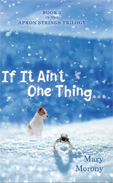
 |
The original Mackey family has four grown children and multiple grandchildren, many who reside elsewhere. Virginia, Ginny and Joe’s spoiled grand-daughter from New York, decides she wants her Christmas wedding at the Mackey family home in the hills of Virginia. Daughter Sallee has always allowed Virginia to have her own way per husband Peter’s orders. Lavish invitations are sent out to invite family members to return home, many for the first time in decades. Drama results when grown Mackey children Stuart, Sallee, Gordon, and Helen respond and face sibling issues long buried.
The subtitle of this endearing book could have been “What would Ethel have said?” Flashbacks are used repeatedly to provide backstory. Invariably these remembrances are about Ethel, the family’s beloved black cook and nanny, and the gems of wisdom she imparted to Ginny’s household... including this book’s evocative title. Current topics uncovered in the 273-page novel are sibling rivalry, death-by-drunk-driver, meditation, pornography, child abuse, gay marriage, racism, aging, and death, including voluntary death. Quite a list! Fortunately, some issues are only recalled from earlier Apron Strings stories in Books 1 and 2.
More than just a storytelling method, the author expertly uses backstory to flesh out her characters. For example, it graphically explains why a grandson now makes and sells pornographic movies. Where backstory is not employed, the character sets seem stereotypical; for example, the reader will not be surprised that daughter Helen’s lesbian family includes a black son and adopted Asian daughter.
The author deserves kudos for creating and keeping straight such a plethora of characters, many with similar names. This almost mandates a character list; the lack could frustrate new readers. With so many complicated lives, it is also difficult to pick out the main protagonist around whom the story revolves. Is it Ginny Mackey, her husband Joe, daughter Sallee, or granddaughter Virginia? All experience internal growth and might easily become the focus of the author’s next novel. Earlier books appear to tell Ginny’s story. The reader will likely agree that Book 3 focuses more on Joe Mackey and his emotional struggle with aging and death. From page 51 onward in this book, he toys with the idea of a voluntary death wish until on page 269 he espouses a change of attitude. Along the way, the author has given Joe some quasi-memorable quotes: “The timing is off” and “I guess the hemlock ship has sailed for now.”
Was Joe struggling with the aging process and trying to gain sympathy and attention from his wife? The author touchingly presents the couple’s conversations around his plan to die on purpose, which clearly upset Ginny. Unfortunately, when men toy with ending their lives, they usually choose the deadliest means―no slashing wrists with the possibility of rescue like his disappointed grand-daughter does after canceling her wedding. Joe has both the knowledge and access to use deadly means.
So, what happened to change Joe’s way of thinking about life and death? Was it having his family gather around for the Christmas wedding, with a blizzard dumping snow that prevented them from leaving? Or was the change prompted by finally accepting responsibility for the emotional support of his wife? Could Joe also have begun to realize that his wisdom and experience were still needed―to impart direction to Mackey grandkids and impact the next generation? Let the readers decide!
RECOMMENDED by the US Review